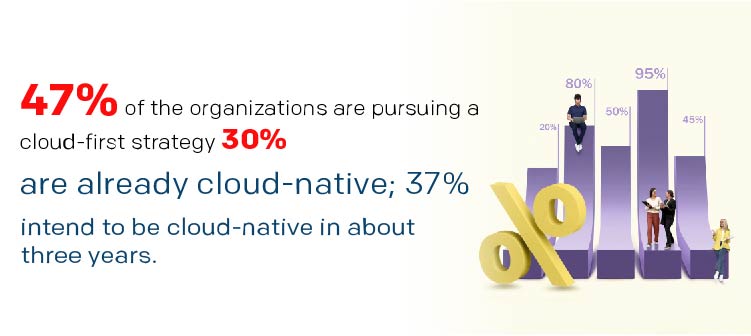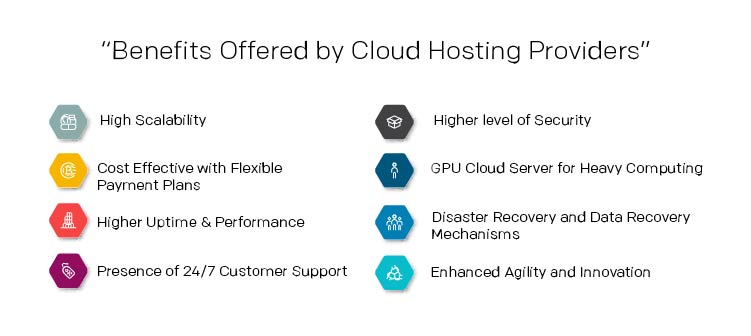-
Get Cloud GPU Server - Register Now!
Toggle navigation

Cloud service providers have become crucial allies for organizations in the age of digital transformation, helping them reach previously unheard-of levels of success and innovation.
The cloud has drastically changed the way organizations operate by using cutting-edge technology to boost productivity and accelerate growth. Cloud service providers are playing a major role in this digital transformation by offering services to businesses across all scales and industries. The cloud provides everything, including storage options for storing enormous volumes of data, processing capability to operate sophisticated apps, and advanced analytics for data-driven insights. This blog aims to explore various service models offered by cloud services along with various advantages and benefits.
It is important to understand that there are cloud service providers all around the world before we can fully discuss the subject. The expansion of service providers supplying premium goods at competitive prices has been sparked by the rising demand for cloud services.
As we’ve seen, there is a huge need for cloud computing on a global scale, and it is anticipated that this demand will only grow over the coming years. We will now become more specific and learn about the service models that cloud service providers offer, followed by perks and benefits.

The most popular type of cloud service, SaaS, is a whole application developed by a third party with a specific goal in mind, such as document sharing or customer relationship management (CRM). The SaaS vendor remotely updates, manages, and resolves issues with the cloud application. In this case, the client organization that avails SaaS has access only to the software rather than having access to the infrastructure or platforms.
PaaS offers a foundation for software development so customers may create unique apps and tech stacks without having to start from zero. A secure infrastructure, data integration, hosting capabilities, a programming environment with API libraries, and preset app functionality are all already built into the back end.
Enterprise clients use IaaS to manage their own data and provide their own software, operating systems, and middleware while IaaS provides a secure IT infrastructure with hosting and storage options. This allows IT more control while offering a virtual data center without the need to buy any hardware. In this particular, the entire hardware and infrastructure is provided to the client organization for use but is owned and managed by the service provider.

Resource forecasting is almost impossible since resource requirements fluctuate throughout time. Thus, the capacity to scale up or down as necessary is essential for any firm choosing cloud hosting or any other cloud-related duty. With the help of cloud service providers, you can quickly scale up or decrease the number of resources as needed to keep your business functioning smoothly. You can always ask your service provider for more resources if your current ones are depleted or if you need them.
Cloud service companies are renowned for offering the ideal blend of substantial benefits and low expenses. You may significantly reduce and control the cost of infrastructure setup and maintenance by developing a strategic partnership with a cloud service provider. Since you need to pay only for the resources consumed, you end up saving much higher on operational expenses. Apart from that, you do need to physically manage and maintain servers as they are maintained by the cloud service provider. Cloud service providers have multiple pricing plans available as per the resources which allows you to choose the best plan as per your requirements and budget.
Nothing is more frustrating than facing regular downtimes while hosting any application or website on the cloud. Having downtimes can not only disrupt business operations but can also result in significant losses. To minimize this, cloud service providers ensure at least 99.99% uptime which ensures business continuity. Service providers deploy a team of highly skilled technicians who constantly monitor the health of servers and cloud infrastructure. These technicians continuously upgrade the infrastructure and resolve any technical issues at the earliest to keep the systems running.
While using cloud-based systems, there is always a chance that you could face a technical issue and you might want to connect with a professional for assistance. This is highly critical as delays in resolutions can significantly impact critical business operations and cause losses. This is important to address technical issues on time. Cloud service providers usually have a highly qualified and trained customer service team that is available 24/7 to answer all your queries and provide an effective solution as quickly as possible. They can provide resolution over the call, mail, chat, and ensure that the technical issue is resolved at the earliest. This gives you peace of mind that professional assistance is available in case of a technical issue.
There is a greater risk of cyberattacks and unauthorized access to websites that may lead to data loss on websites and applications that are getting hosted on cloud platforms. cloud service providers deploy state-of-the-art security measures that keep your websites and data secure from external threats and cyber attacks. While security can be configured on physical servers, it’s often more straightforward and comprehensive in a cloud environment. Service providers routinely apply the most recent security patches to their infrastructure to reduce the danger of any external threat. In addition, they adhere to several industry, governmental, and security standards, which gives you peace of mind that your data and applications are secure.
Whether you want to leverage the power of Machine Learning or perform high-quality rendering on graphics, Cloud hosting in India will certainly cater to your requirements. Cloud service providers with GPU Servers allow you to take advantage of new developments and upgrades as they are released, without investing in new hardware each time.
Even after implementing a number of security measures, integrating them, and abiding by legal requirements, there is always a danger of a cyber attack or data loss. Data loss may be brought on by a technical problem or an external element, such as a cyberattack. Vendors establish rigid Disaster Recovery Management policies and procedures to recover data and get access as soon as feasible in the event of a data loss or cyberattack. Cloud service providers can undoubtedly help your applications or websites recover from disasters quickly thanks to their effective and efficient practices.
Markets are becoming more and more competitive across all industries, and customer expectations are higher than ever. Organizations must anticipate disruption and be ready to quickly adjust if they are to survive and prosper. Otherwise, they risk becoming irrelevant and losing out in the competitive market. Additionally, they must maintain their attention on continuously enhancing the consumer experience, or else they risk falling behind rivals. Cloud service providers enable businesses to innovate more quickly, use resources wisely, and acquire insightful information about the customer journey and how to enhance it with an efficient cloud strategy. Good cloud providers frequently update their products and introduce new features, offering organizations access to the most cutting-edge technology.
To sum up, it would be ideal to claim that the cloud industry all across the globe has shown significant growth and is expected to rise further in the upcoming years. With various organizations adopting cloud hosting instead of traditional hosting, the digital landscape is transforming with each passing day. With the sudden rise in cloud computing and hosting, huge numbers of cloud service providers have entered the market offering cutting-edge solutions at an affordable price. Offering SaaS, IaaS, and PaaS service models, cloud service providers are sure to cater to all your requirements. In addition, the huge number of benefits offered by cloud hosting providers completely justify why businesses opt for cloud outsourcing.
FAQs
Q1 What’s the future of cloud services?
Answer: As cloud services become more widely available, so will their utilization in the business world. Whether a company decides to expand its present on-premises software installations or completely relocate to the cloud, these services will continue to make it simpler for businesses to distribute mission-critical programs and data to their workforce. With options ranging from desktop virtualization to application delivery, cloud services are altering how people work and how businesses operate.
Q2 What do I keep in mind while choosing the cloud strategy?
Answer: You may select the best cloud for your business based on its needs, size, computing platform, IT infrastructure, and long-term goals. Almost usually, a contemporary IT organization’s cloud implementation plan includes cloud service providers. Managing hardware, software, services, or a mix of these may fall under this umbrella. You must first choose which cloud services are required to meet your company objective. Once you have analyzed your requirements, you may proceed ahead and select the best cloud hosting provider that can cater to your needs. While selecting the service provider, you should always consider which cloud technologies your firm can manage internally and which ones should be handled by a cloud service provider.
Q3 What is Cloud Computing?
Answer: Any hosted service that is offered online is referred to as cloud computing. These services frequently consist of servers, databases, software, networks, analytics, and other cloud-operated computer tools. Users of the service may access files and applications stored in the cloud from any location, doing away with the need to constantly be close to actual hardware. Because the information truly resides on a network of host computers that transport data over the internet, cloud computing makes the papers accessible from anywhere.
Q4 How does cloud computing work?
Answer: In essence, the cloud is a decentralized space where data may be shared over satellite networks. Every cloud application needs a host, and that organization is in charge of operating the enormous data centers that offer the security, storage space, and processing power required to keep all of the user-submitted data in the cloud. In addition to providing the user with an environment that allows devices and applications to connect with one another (for instance, download a song on your laptop and it will immediately sync to the music app on your iPhone), these hosting businesses may sell the rights to use their clouds and store data on their networks.